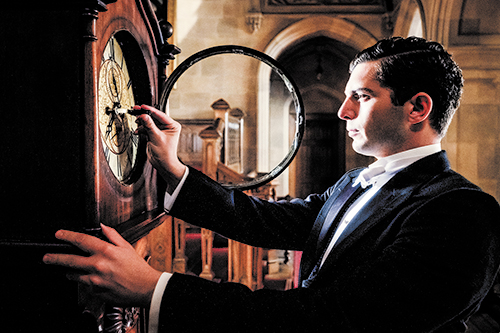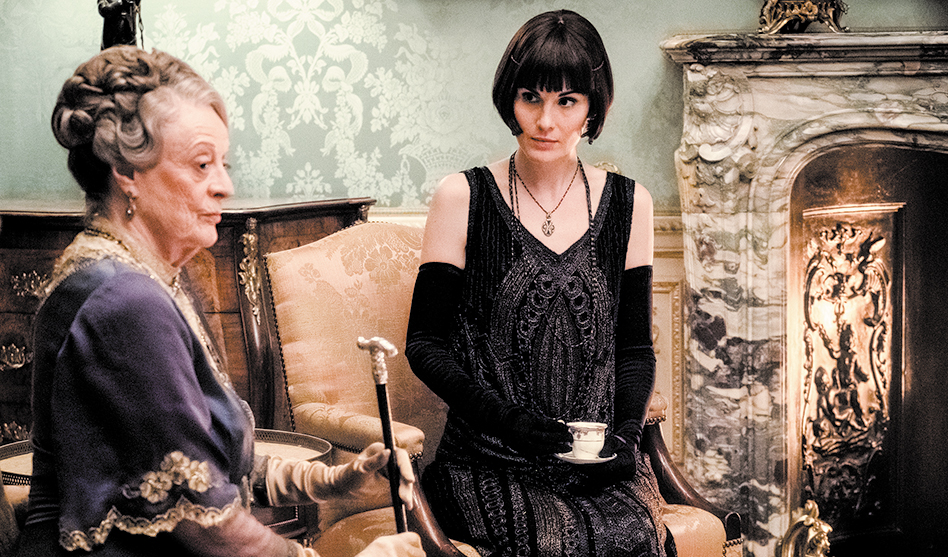Maggie Smith, above left, makes an indelible big screen impression reprising her role as the Dowager Countess in the film adaptation of ‘Downton Abbey;’ right, gay butler Barrows (Robert James-Collier) finally finds love.
When you’re a lord and life is making you lonely, you can always go to ‘Downton’
ARNOLD WAYNE JONES | Executive Editor
jones@dallasvoice.com
As much as you may have enjoyed the TV version of Downton Abbey in the comfort of your parlor, I doubt more than a handful of us watched it with more than a few friends at a time. It was a Sunday night show, a post-game-day palate cleanser consumed like an aperitif in the privacy of one’s chambers. It was not, for all intents and purposes, a communal experience, except in the Monday morning recap around the water cooler with like-minded aficionados.
All of which means its transfer to the silver screen hardly promised a sure thing. It could feel merely bigger and longer, like a Christmas episode or a season finale, not a uniquely cinematic enterprise.
Then, when the familiar opening theme begins — the rush of violins, conjuring servants scurrying behind the scenes, paired with a stately, staccato piano of the rigid gentry frittering away above — you feel a rush of excitement ricochet through the theater, reminding you of something comfortable but new. And you know: Downton Abbey was made for the big screen.
 It has roots there anyway. The series creator, Julian Fellowes, had already penned the 2001 film Gosford Park, which set up a similar dynamic. But we know these characters more deeply (the scroll of 20-plus names in the opening credits reminds you how massively), but it retains an intimacy.
It has roots there anyway. The series creator, Julian Fellowes, had already penned the 2001 film Gosford Park, which set up a similar dynamic. But we know these characters more deeply (the scroll of 20-plus names in the opening credits reminds you how massively), but it retains an intimacy.
The camerawork was always one of the secret weapons of Downton Abbey, as it fluidly scurries through the corridors of the servants, turning suddenly to follow a visitor upstairs, then later, pushing in from a low angle on the decorous appointments of the drawing rooms and libraries, taking in the grandeur of the setting while reminding us that the people occupying the spaces are of a very human scale.
The plot concerns a visit to Downton by King George V and Queen Mary, and the havoc it wreaks on the Granthams and the staff. The challenge is in finding adequate action for all the characters to do. Mr. Bates (Brendan Coyle), whose tentative courtship of Anna (Joanna Froggatt) formed a fulcrum of the series, barely registers in the film (though Froggatt has a lot to do); Mary’s (Michelle Dockery) new husband (Matthew Goode) doesn’t even make an appearance until the final scenes.
But, as the saying goes, there’s not much there, but what there is, is choice. A side plot about a burgeoning romance between the closeted butler Barrow (Robert James-Collier) and a visiting royal attendant provides some of the most poignant moments while slyly commenting on contemporary gay life; an assassination plot, while clumsily inserted, gives Allen Leech a few good scenes.
But Maggie Smith’s Dowager Countess continues to be the droll engine that propels the comedy. She, parrying with rival Mrs. Crowley (Penelope Wilton), is responsible for at least the first half-dozen belly laughs, if not all of them. But she also turns in a heartbreaking, stiff-upper-lippy turn at an unexpected moment, reminding us that there ain’t nothing like this dame. If she doesn’t coast to an Oscar nomination, I’d be surprised.
It’s possible that you already need to be a fan to fully “get” Downton; I am, so I might not have been able to divorce myself fully from its history. But I suspect even newcomers will find themselves enchanted by the pageantry, the silliness and the realization that, less than a century ago, the world was a very different place, though still quite modern. It makes it possible to endure life a few years more at least, as we stumble through the new millennium. Civility, we can hope, endures.













